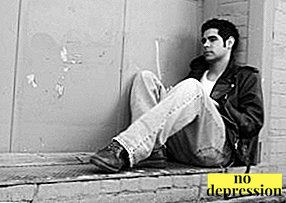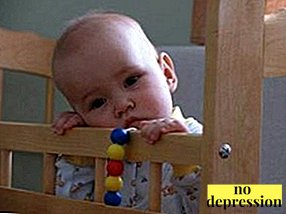Every person's mood changes throughout the day.
Usually these changes are mild, and if the mood changes too much and too often, this is a reason to go to the hospital.
Heavy, oppressive mood, accompanying person for a long time- a symptom of depression.
To answer the question of why a bad mood is important analyze recent eventsand the answer will be found.
General information

In most cases, a bad mood has clear reasonswhich are easy to identify.
Also with him usually easy to fight: just do what you like, turn on your favorite music, sleep well, talk with friends, talk, eat tasty food, allow yourself to cry.
But the more serious the reason for a bad mood, the longer it will take to feel better.
Severe emotional turmoil often become the impetus for the development of various mental illnesses, such as depression, anxiety disorder, post-traumatic stress disorder, neurosis.
If a person has mental illnesses, a bad mood should not be taken lightly: it is a symptom of a disease that is extremely difficult to cope with, and attempts to change activities or make volitional effort often do not help.
Bad mood can be divided into:
- Suppressed. This is the most common type of bad mood, which is familiar to everyone. A person feels sadness, sadness, laments over something, cries. It can be combined with hard thoughts, self-loathing, or it may not be combined if a person does not have mental diseases.
- Pessimistic. It manifests itself in the form of pessimistic thoughts and statements, such as "This undertaking will fail," "I definitely can not cope with this," "Everything will be very bad," "It will not help me." A person who is in a pessimistic mood, decreases faith in himself and others, he sees mostly negative things in everything. Often combined with a depressed mood.
- Apathetic. Significantly decreases or disappears desire to do something. A person is passive, he wants to lie in bed, sleep, and it is rather difficult to force yourself to do something important. It can be combined with pessimistic and depressed moods.

The border between the norm and pathology is quite thin, but usually the pathology is spoken in cases where a bad mood (in its various manifestations) lasts at least two weeks.
If a depressed mood was preceded by severe emotional upheavals — the death of a friend, a relative, separation from a loved one, loss of work, an acute episode of violence — then the person may also need the help of a psychotherapist.
What do psychologists say?
Bad mood - a natural part of our life and it should not be demonized: it is a normal reaction of the human psyche to various events.
Long-term attempts to hide a negative mood, to contain tears - the way to aggravate mental well-being. Keep in yourself the emotions associated with a bad mood, should not be.
It is also widely believed in society that depression - this is something like just a bad mood, so it is enough to pull yourself together, to do something new - and everything will pass.
But this opinion is completely erroneous, since depression is mental disorder with an extensive symptom complex, and depressed, depressed mood is just one of them.

Moreover, the standard methods of dealing with a bad mood in this case do not work, and you need to undergo specialized treatment.
According to the cognitive approach in psychology and psychotherapy, a bad mood is a consequence of negative automatic thoughts.
Usually these thoughts are directly related to the trouble that has happened in a person’s life and quickly disappear if his psyche is all right. But with depression, they remain, and it is very difficult to cope with them.
Does it happen without a reason?
Bad mood can be for no apparent reason.
Most often this is due to various somatic changes in the human body under the influence of hormones (hormonal disruptions, natural cycle changes, birth defects) or chemicals from the outside (alcohol, drugs, side effects of drugs).
Also, changes in mood and behavior for no apparent reason can be observed in people who have various brain defects, Related:
- traumatic brain injury;
- the consequences of infectious processes (meningitis, encephalitis);
- congenital anomalies;
- benign and malignant tumors (many patients recall that the first signs of the disease were changes in behavior and mood).

Sometimes people think that there is no reason for a bad mood, but in fact they are, and more than weighty.
For example, some people are inclined to consider their problems insignificant, insignificant, and when they are asked about the situation in life, about negative events, they wave it off, saying that everything is fine.
If you dig deeper then it turns out that the spouse is rude, and stressful work, but there was no leave for a long time, and the child has had a bad time at school, and there was a quarrel with his father recently.
Important to rememberthat even minor troubles can gradually erode the psyche, provoking the development of neurosis, depression.
Unreasonable depressed mood, which lasts for a long time, can be a sign of endogenous depression (it can also be called internal depression).
With this disease, according to the existing scientific theory, disrupted serotonin and norepinephrine metabolism.
As a result, a person's life is all right, but because of a defect in the exchange mechanism, he feels hopeless. But depressed mood - not the only symptom diseases.
Why a bad mood?
And I do not want anything
Why is my mood at zero and I don't want anything? it fits the description of apathy: conditions when a person does not feel in himself the strength to engage in useful activities, feels himself devastated and wants only to lie down, sleep, or perform certain activities, soothing him and giving a semblance of satisfaction.

People, especially those who do not know psychology, consider such a state laziness.
But, according to modern psychologists, laziness as such does not exist, and the signs relating to it have a direct connection with the mental health of a person.
Apathy can be observed for many different reasons., such as:
- the consequences of emotional distress (death of a dear person, severe illness, acute episode of violence, loss of job, divorce, and so on);
- the presence of various mental illnesses (apathy is a symptom of many mental illnesses, including depression, neurosis, PTSD, anxiety disorder, schizophrenia);
- somatic diseases (natural changes in the hormonal background, endocrine pathologies, consequences of brain damage of various origins, tumors);
- exposure to chemicals from the outside (side effects of medications, alcohol, drugs).
In people without mental illness, apathetic mood usually occurs. during or after stressful periods (for example, a session, a job at work).
The human psyche is exhausted and needs rest. If you do not give yourself a break, it can lead to the development of neurosis.
And always want to cry

People have this condition. after hard, unpleasant events (death of loved ones, stressful periods during study, work, and so on).
In due course the state of health should be normalized.
It may also be one of the main symptoms. depression or neurosis. If the condition persists for more than two weeks, you should contact the hospital as soon as possible.
For a start, you will need to come to the therapist, since such states can be observed against the background of hormonal disruptions and other somatic deviations. He will give the necessary directions. If the examination did not show the presence of a physical disease, it is necessary to consult a psychotherapist
After drinking alcohol
Alcohol is depressant, contrary to the prevailing opinion. It causes short-term pleasure, which is replaced by depression, a sense of hopelessness. This condition can push the person to drink again to feel better.
Alcoholic beverages have a negative effect on the mechanisms of neurotransmitter exchange and that is why they are considered depressants.
There is a special term - alcohol depression. Also extremely depressed mood is observed in people trying to stop drinking.
If a person is not an experienced alcoholic and just drank more than usual at a holiday, the depressed mood will pass within a few days, you just need to be patient. If mental health is extremely difficult, you should go to the hospital.
On birthday

Why is no mood at all birthday?
Birthday for children is one of the favorite holidays., because everyone gives gifts, congratulations, you can eat delicious food, which in everyday life manages to eat infrequently.
But as they get older, many people change their attitude to birthday towards the negative.
This usually happens for the following reasons:
- A birthday reminds a person that he is older, but not close to achieving life goals. This feeling is especially pronounced during the mid-life crisis.
- Birthday can be associated with aging and remind people that people are mortal.
- If the birthday will not go the way the birthday boy wants, this can also upset him.
Existential experiences often torture people on their birthday, and this is normal. If the sadness about the birthday has been delayed, and the dislike for these days is too strong, it is important to contact a psychologist or psychotherapist.
My husband is constantly in a bad mood.
Why does my husband always have a terrible mood? If a spouse, spouse, friend or relative constantly complains about a terrible mood, looks depressed, emaciated, often crying, this can be a symptom of any mental problems. Most often it is a sign of depression or neurosis.
Also, some somatic pathologies can adversely affect mood, so before visiting a psychotherapist, it is important to undergo an examination in a regular hospital.
Affective disorders in psychiatry
Affect - This is a definition that refers to how a person feels his own mood and how he behaves in accordance with it. There is an extensive list of mental disorders included in the list of affective mood disorders (AVR).
AVR can be divided into:
- Depressive disorders. This category includes absolutely all types of depression, of which there are several dozen. The most well-known types of depression are atypical depression, minor depression, major depressive disorder, seasonal depression. Dysthymia also refers to depressive disorders: a pathological condition in which a person feels depressed for at least two years, but the symptoms are not severe enough to be considered as depression.
- Bipolar disorders. These include bipolar affective disorder and cyclothymia. Bipolar disorders are characterized by mood swings from mania to depression.
- Manic disorders. Mania is a state of inadequately elevated mood, accompanied by mental agitation. Manic disorders include manic syndrome.

The main causes of mood disorders:
- somatic pathologies (most often associated with metabolic disorders of various hormones);
- side effects of drugs, the effects of alcohol, drugs (if you stop using, the mental state, as a rule, returns to normal);
- acute psycho-emotional upheavals (especially in the case of depression);
- genetic predisposition.
If mood disorders have a connection with somatic disorders, it is necessary to eliminate or reduce the severity of these disorders, and then the person’s mental well-being will normalize.
If the disorder is consequence of taking the drugIt is important to replace this medicine with another one or remove it completely.
In other cases, the treatment process is controlled by a psychotherapist who conducts psychotherapeutic therapy and prescribes medications that eliminate or alleviate the main symptoms.
Drug therapy:
- Drug treatment of depression takes place with the use of antidepressants. Sometimes additional medications are prescribed, such as benzondiazepines, tranquilizers, antipsychotics.
- In bipolar disorders, it is shown taking normochemical drugs such as carbamazepine, lithium. Neuroleptics are also prescribed, which should be taken only during the manic phase of the disease.
- Manic syndrome is treated with strong sedatives and neuroleptics.

Specific Medicines are selected by the attending physician, based on the symptoms and severity of the disease.
In psychotherapeutic treatment, high efficiency is demonstrated by methods of cognitive-behavioral therapy, family therapy, and interpersonal therapy.
If you comply with all medical recommendations, you can achieve quick improvements in mental well-being. If there are negative changes in behavior and mood, you should contact the hospital.
What to do if you do not want to do anything and are not in the mood:



